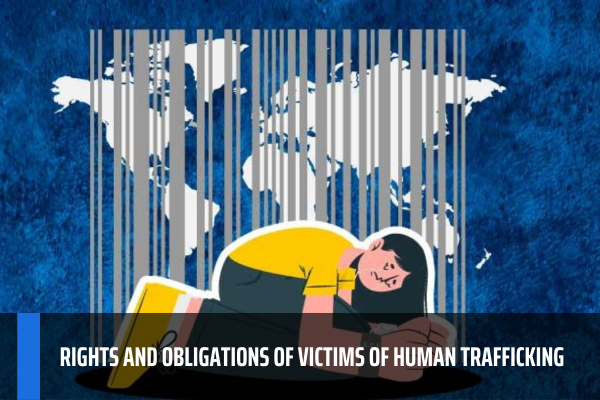How many rights and obligations of victims of human trafficking are there according to the Law on Human Trafficking Prevention and Combat 2011?
- Vietnam: How many rights and obligations of victims of human trafficking are there?
- How many support regimes are there for victims of human trafficking who are Vietnamese citizens or stateless persons permanently residing in Vietnam?
- What are the principles of human trafficking prevention and combat in Vietnam?
Vietnam: How many rights and obligations of victims of human trafficking are there?
Pursuant to the Law on Human Trafficking Prevention and Combat 2011 promulgated by the National Assembly on March 29, 2011.
The rights and obligations of victims of human trafficking are specified in Article 6 of the Law on Human Trafficking Prevention and Combat 2011.
Specifically:
Rights and obligations of victims
1. To request competent agencies, organizations or persons to take measures to protect them or their relatives when they have or are threatened to have their life, health, honor, dignity or property infringed upon.
2. To receive support and protection under this Law.
3. To be compensated for damage under law.
4. To provide information relating to violations of the law on human trafficking prevention and combat to competent agencies, organizations and persons.
5. To comply with requests made by competent authorities concerning human trafficking cases.
Thus, the rights and obligations of victims of human trafficking are regulated into the 5 groups mentioned above.

How many rights and obligations of victims of human trafficking are there according to the Law on Human Trafficking Prevention and Combat 2011?(Image from the Internet)
How many support regimes are there for victims of human trafficking who are Vietnamese citizens or stateless persons permanently residing in Vietnam?
In Article 32 of the Law on Human Trafficking Prevention and Combat 2011, there are regulations on support for victims of trafficking as follows:
Support beneficiaries and regimes
1. Victims who are Vietnamese citizens or stateless persons permanently residing in Vietnam depending on the cases specified in Articles 33 thru 38 of this Law. enjoy the following regimes:
a/ Support to meet essential needs and for travel expenses;
b/ Medical support:
c/ Psychological support;
d/ Legal aid;
e/ Support in general education and vocational training:
f/ Initial difficulty allowance, support in loan borrowing.
2. Victims who are foreigners trafficked in Vietnam may, depending on the cases specified in Articles 33 thru 36 of this Law, enjoy the supports specified at Points a. b. c and d. Clause 1 of this Article.
3. Accompanying minors of victims may. depending on the cases specified in Articles 33, 34 and 35 of this Law, enjoy the supports specified at Points a. b and c. Clause 1 of this Article.
4. The Government shall detail support regimes and the order and procedures for providing supports to victims.
Thus, according to the above regulations, there are 06 regimes for victims of human trafficking who are Vietnamese citizens or stateless persons permanently residing in Vietnam.
Specifically, 06 support regimes for victims of human trafficking include:
- Support to meet essential needs and for travel expenses;
- Medical support:
- Psychological support;
- Legal aid;
- Support in general education and vocational training:
- Initial difficulty allowance, support in loan borrowing.
What are the principles of human trafficking prevention and combat in Vietnam?
Pursuant to the provisions of Article 4 of the Law on Human Trafficking Prevention and Combat 2011, the prevention of human trafficking is carried out according to the following principles:
- To comprehensively take measures to prevent, detect and handle the acts specified in Article 3 of the Law on Human Trafficking Prevention and Combat 2011.
Specifically:
Prohibited acts
1. Trafficking in persons under Articles 119 and 120 of the Penal Code.
2. Transferring or receiving persons for sexual exploitation, forced labor or removal of human organs or other inhuman purposes.
3. Recruiting, transporting or harboring persons for sexual exploitation, forced labor, removal of human organs or other inhuman purposes or for committing an act specified in Clause 1 or 2 of this Article.
4. Forcing others to commit an act specified in Clause 1. 2 or 3 of this Article.
5. Acting as a broker for others to commit an act specified in Clause 1.2 or 3 of this Article.
6. Taking revenge or threatening to take revenge on victims, witnesses, reporting persons, denunciators or their relatives or persons stopping the acts specified in this Article.
7. Taking advantage of human trafficking prevention and combat activities for self-seeking purposes or for committing unlawful acts.
8. Obstructing the reporting, denunciation and handling of the acts specified in this Article.
9. Stigmatizing or discriminating against victims.
10. Disclosing information on victims without their consent or their lawful representatives'.
11. Impersonating victims.
12. Committing other violations of this Law.
- To promptly rescue, protect and receive, accurately verify, and support victims. To respect the rights and legitimate interests of victims and neither stigmatize nor discriminate against them.
- To bring into play the roles and responsibilities of individuals, families, communities, agencies and organizations for human trafficking prevention and combat.
- To prevent, detect and strictly, promptly and properly handle the acts specified in Article 3 of the Law on Human Trafficking Prevention and Combat 2011.
- To promote international cooperation in human trafficking prevention and combat in accordance with the Constitution and laws of Vietnam and international laws and practices.
LawNet